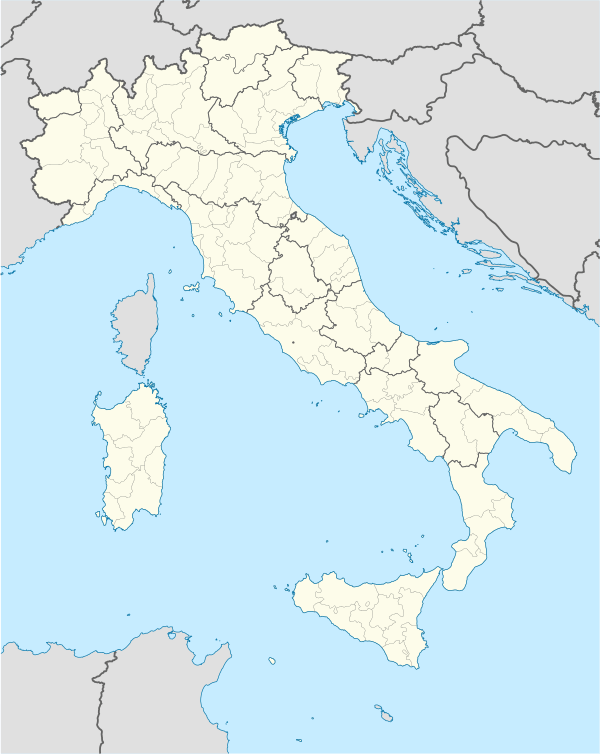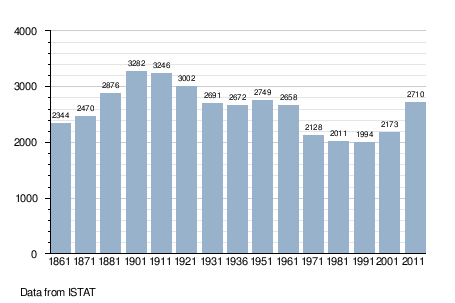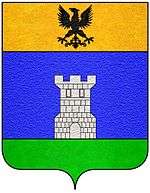Gravellona Lomellina
| Gravellona Lomellina | |
|---|---|
| Comune | |
| Comune di Gravellona Lomellina | |
 | |
 Gravellona Lomellina Location of Gravellona Lomellina in Italy | |
| Coordinates: 45°20′N 8°46′E / 45.333°N 8.767°ECoordinates: 45°20′N 8°46′E / 45.333°N 8.767°E | |
| Country | Italy |
| Region | Lombardy |
| Province / Metropolitan city | Province of Pavia (PV) |
| Area | |
| • Total | 20.4 km2 (7.9 sq mi) |
| Population (December 2010) | |
| • Total | 2,651 |
| • Density | 130/km2 (340/sq mi) |
| Time zone | CET (UTC+1) |
| • Summer (DST) | CEST (UTC+2) |
| Postal code | 27020 |
| Dialing code | 0381 |
| Website | http://www.comune.gravellonalomellina.pv.it/ |
Gravellona Lomellina (Gravalùna in the local variety of Western Lombard) is a comune (municipality) in the Province of Pavia in the Italian region Lombardy, located about 35 km southwest of Milan and about 35 km northwest of Pavia. As of December 2010, it had a population of 2,651 and an area of 20.4 km².[1] It's an agricultural town (its main product is rice).
Gravellona Lomellina borders the following municipalities: Cassolnovo, Cilavegna, Tornaco, Vigevano.
Demographic evolution

History

The very first traces of a settlement in this location date from the late Bronze Age,[2] with the pre-Celtic Golasecca culture. Toponomy could be from the etruscan. A Roman settlement is testified by some traces such as two coffins and some coins from the first Empire period. According to tradition, before the Battle of Ticinus, Hannibal built the carthaginean camp amongs the nowadays towns of Gravellona, Cassolnovo and Piccolini, hamlet of Vigevano. During the middle ages, Gravellona belongs to the archbishop of Novara, who gaves executive power to Ingone. In 1152, Emperor Fredrick Barbarossa confirm feudal power to the "Barbavara" family, from Valsesia. They ruled Gravellona until 1797. Gravellona came under the control of Pavia probably in 1164, and in 1250, the list of lands Pavia,it appears like Gravalona. In 1332 the castle of the counts in Gravellona, however, belong to Cavallazzi family, which, together with Barbavara and Tornielli, are the oldest feudal lords of Gravellona. In 1581, the population gravellonese stood about 1000 inhabitants.
In 1532 Gravellona (who had since returned to the County of Novara) was joined to the new province of the County of Vigevano or Vigevanasco . In 1543, with the Vigevanasco, was absorbed from the domains of Savoy, which since 1707 owned Lomellina. In 1818 the Vigevanasco was reunited with Lomellina, which in 1859 became part of the province of Pavia. Although in the province of Pavia, on the border of the Diocese of Vigevano, Gravellona belongs to the Diocese of Novara.
Economy
The main sector of the economy gravellonese (as also of the neighboring municipalities of Lomellina) is agriculture. In particular, an intense rice cultivation, cultivation guaranteed by the flow of water in particular of the Canal Quintino Sella. To evidence also the cultivation of poplars and corn. Also of note the presence of a small industrial area.
Culture
Festa dell'Arte (Festival of Arts)
Gravellona Lomellina is known in Lomellina as "paese d'arte" (artistical town), because of various works of art placed all around this town during the Festival of Arts. Starting from 1992, on the first weekend of June, Festival of Arts is a festival all around Gravellona, with some folkloristic and artistical events, and a brand new stationary work of art every year. Some of these works are, for instance, frescoes and murals,shapes in wrought iron on the roofs, mosaics on the pavements and so on.
Twin towns
Gravellona Lomellina is twinned with:
-
 Linards, France
Linards, France
Gallery
 The town hall is decorated with frescoes and sculptures in iron
The town hall is decorated with frescoes and sculptures in iron- View of the village Barbavara
 Mosaic on a sidewalk in square Delucca
Mosaic on a sidewalk in square Delucca- The pediment of the church with the iron sculpture of a witch
 A dolmen installed during a festival of Art
A dolmen installed during a festival of Art Silhouettes of rural life along a wall
Silhouettes of rural life along a wall Artistical Totem in the Park "of the Three Lakes"
Artistical Totem in the Park "of the Three Lakes" Silhouettes of zebras and green kerbstones (Festival of Art 2011)
Silhouettes of zebras and green kerbstones (Festival of Art 2011) "Costume Grigionese" of Segantini,reproduction exposed along the streets of the town
"Costume Grigionese" of Segantini,reproduction exposed along the streets of the town "L'Alzaia" of Telemaco Signorini,reproduction exposed along the streets of the town
"L'Alzaia" of Telemaco Signorini,reproduction exposed along the streets of the town "Fiumana", of Giuseppe Pellizza da Volpedo, reproduction exposed outside a private house.
"Fiumana", of Giuseppe Pellizza da Volpedo, reproduction exposed outside a private house.
References
- ↑ All demographics and other statistics: Italian statistical institute Istat.
- ↑ Colli, Don Ernesto (1960). Gravellona Lomellina nella sua storia.
![]() Media related to Gravellona Lomellina at Wikimedia Commons
Media related to Gravellona Lomellina at Wikimedia Commons